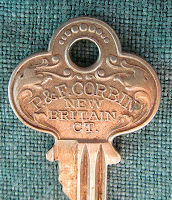You can find old keys in nearly every flea market or shop – sometimes they’re stored in Mason jars, old coffee tins, or even just strung along a length of wire – and for years I simply passed them by, paid no attention.
But once, when I was idling away some time in a little shop in Topsham, Maine, I found an old cookie tin full of them, reached in for a few – just a few, mind you – to take a look.
And look I did, for a good half-hour: Car keys, door keys, cupboard and file cabinet keys; keys for padlocks and post office boxes; keys for rolltop desks, steamer trunks, library card files...keys, keys, keys.
I was surprised by the craftsmanship, by how beautiful they were!
Made of brass, mostly, they had company names and logos and designs tooled into their faces; they were wonderfully heavy, had heft and substance to them; they felt good in my palm.
I bought a few – six or seven, maybe – and brought them home, cleaned them up a little bit, then placed them in a small bowl on a end table in my living room.
When people come to visit, they can’t keep their hands off them: guests poke and push at them with index fingers, swirl them around in the bowl and, eventually, everybody lifts at least one out of the bowl for a closer look.
And everybody’s surprised by how lovely they are!
I’ve given a few away, sometimes people ask if they can have one (I always say yes), and I have a suspicion that a few have been pocketed – I prefer to think inadvertently – so every now and then I have to replenish my supply.
Take a look at these:
The company went out of business in 1975.
P & F Corbin (New Britain, CT, 1848) – founded by brothers Philip and Frank Corbin, the first products of the company were ox balls, which were used by farmers and drovers to cap the tips of their animals’ horns (you can see these balls in old photographs). They later produced all manner and kind of hardware: locks and keys, coat hooks, doorknobs and doorplates, even coffin “trimmings.” Philip Corbin died in 1910.
The company, after several mergers, is now part of Stanley
Francis Kiel & Son (New York, 1876) – had a huge factory on 163rd Street New York City
At any rate, Kiel
This key is my absolute favorite!
Independent Lock Co. (Fitchburg, MA, 1926). Morris Falk invented a machine to tool hairpins; when hairstyles changed and the hairpin market ran dry, he switched over to making keys, and in 1926 moved the business from Leominster to Fitchburg. He bought up other smaller companies, and by the end of WWII, had a multi-million dollar business! He patented rekeyable locks for cabinets and drawers; in 1942 he applied for a patent for a process for making key blanks.





Thanks for the history lesson. Information on Kiel is hard to come by on the internet. Your article was helpful. I am currently restoring a Kiel #2 key duplicating machine.
ReplyDeleteFB 2013 ballassociate(s)-at- yahoo
I just aquired a Keil #3.5 cutter machine. I am thinking of restoring it. How is your restoration going. Any tips would be appreciated.
DeleteThanks, Rage
Hello.. Francis Keil was my great great grandfather. I am anxiously searching for pieces of my family's history, if you'd be interested in parting with any? Please contact me at jzackrison@yahoo.com
DeleteJust found your comment, Anonymous -- thanks for stopping by; sorry I didn't see it earlier! I'm curious about your restoration project -- what will you do with the thing when you're done?
ReplyDeleteHello Deb.. Francis Keil was my great great grandfather. I am anxiously searching for pieces of my family's history, if you'd be interested in parting with any? Please contact me at jzackrison@yahoo.com
ReplyDelete